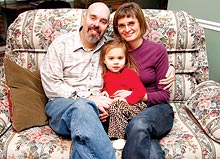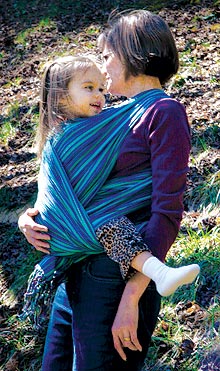When Tara McDonald-Tiner was pregnant with her daughter, Olivia, she and her husband were so preoccupied about the impending birth that the couple didn’t focus on what parenting style they’d use once the baby arrived in the world.

After Olivia was born, there was no time for the Brevard mom to read up on parenting books until her daughter was 4 months old.
“We felt really ill-informed,” recalls McDonald-Tiner. “I just wish I had known more. Earlier.”
She’s now an active proponent of attachment parenting, an approach to taking care of babies and young children that—judging by all the moms toting babies in slings and wraps around Asheville—has a devoted local following.
Attachment parenting is aptly named: Simply put, it all centers on nurturing and strengthening the bond between baby and parent. Some key features include babywearing (carrying the baby in a sling or other soft carrier next to your body), co-sleeping (baby and mother sleeping together instead of baby in a crib in her own room) and breastfeeding on demand (versus a nursing schedule).
Probably the best-known attachment-parenting guru is Dr. William Sears, a physician, father of eight and co-author (with his wife, Martha Sears, a registered nurse) of The Attachment Parenting Book: A Commonsense Guide to Understanding and Nurturing Your Baby (Little, Brown and Co., 2001).
“Attachment parenting is a highly intuitive, high-touch style of parenting that encourages a strong early attachment, and advocates consistent parental responsiveness to baby’s dependency needs,” the Searses note on their Web site (www.askdrsears.com). “Rather than give parents a strict set of rules about when to breastfeed or when to respond to a cry, Dr. Sears’s approach encourages parents to learn and work with their baby’s particular cues.”
Parenting from the gut

Fairview resident Susan Mooney, a local independent childbirth educator, doula, La Leche League leader and facilitator of a postpartum support group, has had years of experience with attachment parenting, starting with her own two daughters, who are now ages 16 and 24.
Mountain Xpress: How would you explain attachment parenting to someone who’s never heard of it before?
Susan Mooney: I think attachment parenting would be described as parenting from the gut. Parenting from a point of communicating with the child, of meeting the child where the kid is and meeting their needs. And in the beginning, their needs and their wants are the same, and eventually figuring out what the difference is as they grow older. I carried my babies a lot. I didn’t have a sling or anything like that. I wish I would have known about that. But wearing the baby, feeding the baby on cue or demand or whatever the buzzword is. I think co-sleeping or at least sleeping close by your baby is part of attachment parenting. And guidance rather than discipline.
What’s the goal of attachment parenting?
I think the goal is an emotionally healthy, happy child … I just think it’s so sad when parents kind of dread being around their kids.
Name your favorite attachment-parenting myths.
My favorite attachment-parenting myth is, “They’ll never be independent”—and they’ll always say that when you’re holding a 6-week-old baby. They’re a baby! … You get a more dependent child in the long run if you respond inconsistently or not at all, because [the children] need to escalate and escalate.
What’s the opposite of attachment parenting?
“Baby trainers.” On Becoming Babywise [by Gary Ezzo and Robert Bucknam] is probably the exact opposite of attachment parenting. [Ezzo’s controversial teachings include an infant feeding schedule that alarmed pediatricians in the late 1990s who were seeing dehydrated babies with slow growth and development. In response, the American Academy of Pediatrics reaffirmed that “the best feeding schedules are ones babies design themselves.”]
What’s the payoff for attachment parenting?
Oh, the payoff is wonderful. You get sleep. The kid is so much more portable … They’re happier, they’re easygoing. They’re nice people. I like being around my kids.
In the zone
Although McDonald-Tiner had read the Searses’ book, the principles of attachment parenting didn’t really click for her until she read The Continuum Concept: In Search of Happiness Lost by Jean Liedloff (Addison Wesley Publishing Co., 1986). In Liedloff’s research into nonindustrialized cultures, she concluded that to achieve optimal development, babies have genetic expectations to be in constant physical contact with their mothers.
Yet McDonald-Tiner observes that our society emphasizes separation and disconnection. “We sit them in the crib, in the playpen, in the bouncy seat, in the stroller, in the car seat, in the walker,” she notes. “We have all these contraptions to put them in to be away from our bodies.”
In the first few months of her daughter’s life, McDonald-Tiner says she held and carried her as much as possible. But after finishing The Continuum Concept, she started wearing Olivia in a sling, and switched her baby from a bassinet to the family bed. She also breastfed on demand—“I didn’t put any limits on that at all”—something she plans to continue to do so long as it’s mutually beneficial for both her and her daughter, who is about to turn 3.
She says that one of the main benefits of attachment parenting is a feeling of intuitive connection and being “in the zone” as a parent. “I can sense when my daughter and I are ‘off’ and need to reconnect, same as with my marriage,” McDonald-Tiner offers. “I also think we see a lot less behavior problems out of her because her foundation, her center, that attachment bond, is getting filled up. There is a trust between us, and she knows we will meet her needs—not all of her wants, but as many of her needs as possible.
“Because we plan on, try to live out, and expect a nonadversarial relationship with her, she obliges—kids fulfill our most unseen minute expectations to the letter.”
Weaverville resident Joan Pinegar, a midwife for 20 years—as well as a mother of two and grandmother of one—wholeheartedly believes in the value of a strong bond between parent and child. Attachment parenting, she says, produces confident kids.
“I think they are emotionally sound individuals who understand intimacy and relationships and are capable of communicating their needs with people across the board,” Pinegar declares. “I think children who come from AP families are much more confident in their decision making, in big decisions, like what’s right and what’s wrong, like when someone’s being bullied.”
Asked if there are any downsides to attachment parenting, Pinegar puts it bluntly: “It’s exhausting.” Plus, “you’ve got to be ready for an extremely independent-thinking child.”
McDonald-Tiner says that getting your own needs met as a parent is a key to making it all work, which is tough to do in a society of isolated nuclear families far from extended-family members. “The downside of AP is sometimes feeling like you are ‘touched out,’” she explains, adding that parents (who themselves may not have gotten their needs met as infants) have to get some time to themselves to refuel.
If the entirety of attachment parenting sounds too daunting to attempt, Pinegar says there’s one thing any parent could do that’s the most important of all.
“I think you should listen to [your] child,” she advises. “That’s more important than anything. It’s very obvious what babies need if we stop and watch them and just be present. I think babies carry infinite wisdom. I don’t think there’s anybody closer to a godlike state than a newborn.”
For more info on babywearing workshops (or a babywearing e-mail consultation), contact Tara McDonald-Tiner at jubaltara@yahoo.com.
[Tracy Rose is an Asheville writer, editor and mom (who is very attached to her son, Ryan).]
Parenting resources
There’s more than one way to raise healthy, happy children. And our community has a number of resources available to help parents do just that.
Cathy Hohenstein, a family and consumer-science agent at the Buncombe County Center of N.C. Cooperative Extension, teaches a free eight-week parenting class called Parenting Matters. The curriculum covers child development, effective communication, dealing with stress, discipline, building support systems and more.
Hohenstein also leads a task force of people involved in parenting education in our area, which has representatives from a number of agencies, including Caring For Children’s Family Connections program (which also offers free parenting classes, including one in Spanish), Mission Hospitals’ Stroller Club and ARP/Phoenix, which serves individuals and families with mental-health issues or substance-abuse problems.
For more info on local parenting classes or resources, contact Hohenstein at 255-5522 or cathy_hohenstein@ncsu.edu.



Before you comment
The comments section is here to provide a platform for civil dialogue on the issues we face together as a local community. Xpress is committed to offering this platform for all voices, but when the tone of the discussion gets nasty or strays off topic, we believe many people choose not to participate. Xpress editors are determined to moderate comments to ensure a constructive interchange is maintained. All comments judged not to be in keeping with the spirit of civil discourse will be removed and repeat violators will be banned. See here for our terms of service. Thank you for being part of this effort to promote respectful discussion.